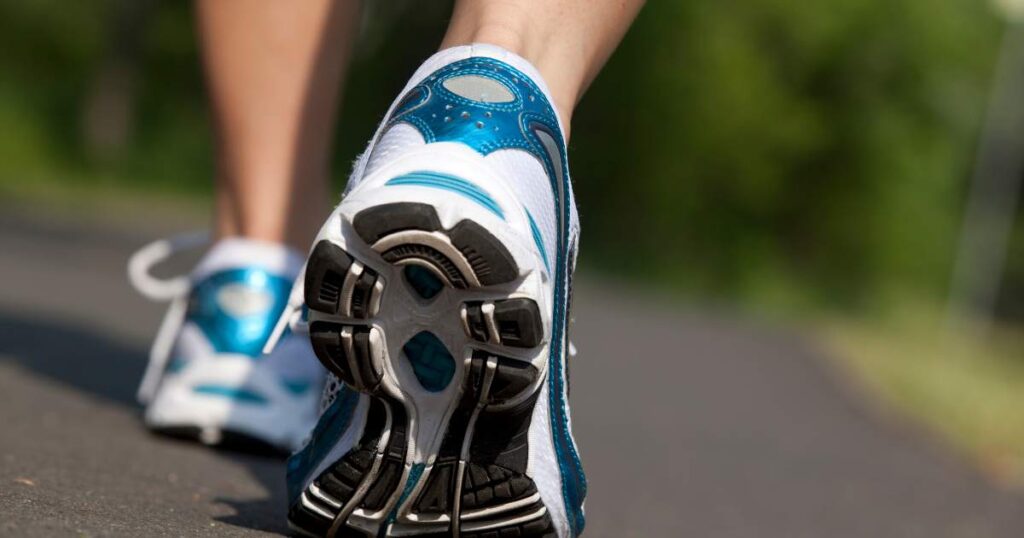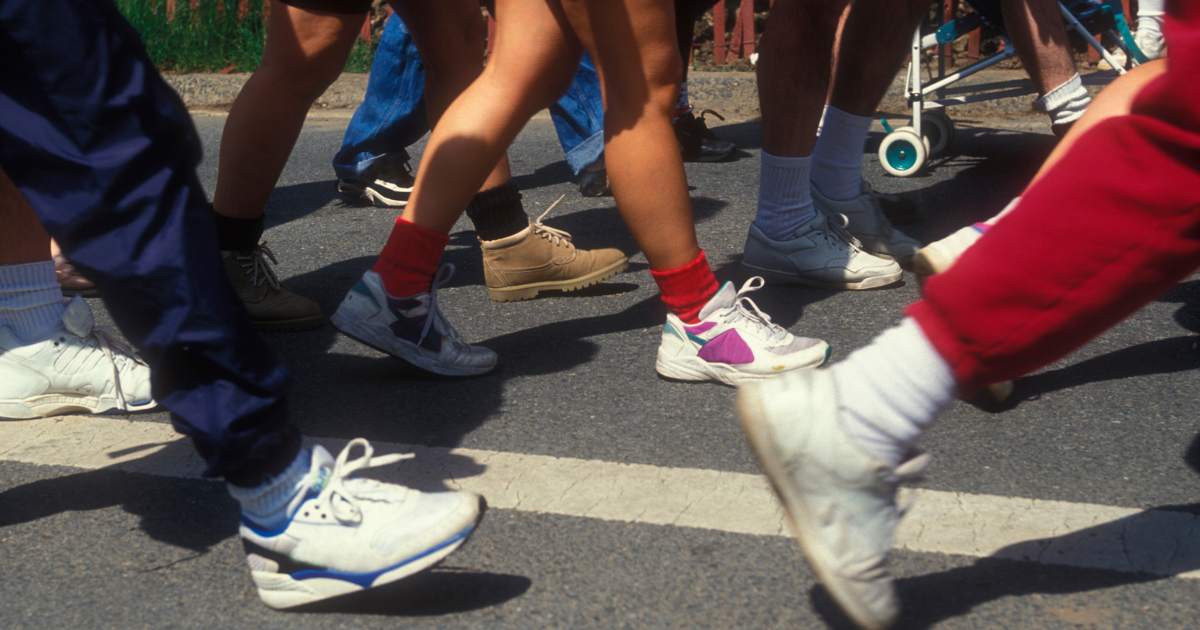Have you ever wondered how long it takes to walk 2 miles? As a popular target for daily fitness, knowing what goes into a 2-mile walk time can help you set goals and monitor your progress.
This in-depth guide explores all the factors impacting walk time – from age and gender to walking pace, treadmill settings, terrain, and more.
With data tables and tips, it aims to help beginners as well as experienced walkers approach the 2 mile mark with more confidence.
So lace up your shoes and let’s covering everything you need to know about the time to walk 2 miles.
How Far is 2 Miles
When setting out to walk 2 miles, it helps to understand exactly what that distance entails. Two miles is equivalent to approximately 3.22 kilometers or 1.24 miles.
Here’s a breakdown to put it in perspective:
- 3,220 meters
- 2.5 times around a standard track
- 3520 yards
- A little over 1 hour at a moderate 3 mph walking pace
Knowing the length can help motivate you tackle it one step at a time.
How Many Steps in 2 Miles
The number of steps it takes to walk 2 miles varies based on your stride length. Stride length is the distance between where your left and right foot hits the ground.
Here is the approximate range:
- Short stride length (~2 feet): 5,000 Steps
- Average stride length (~2.5 feet): 4,000 Steps
- Long stride length (~3 feet): 3,350 Steps
Tracking steps using fitness wearables is an excellent way to monitor your progress. Knowing your stride length helps calculate distance more accurately.
Chart: Converting 2 Miles into Different Units
| Unit | Distance |
| Kilometers | 3.22 km |
| Meters | 3220 meters |
| Yards | 3520 yards |
| Feet | 10560 feet |
| Inches | 126720 inches |
| Nautical Miles | 1.74 nautical miles |
How Long to Walk 2 Miles by Age and Pace

Your age and fitness level impacts how quickly you can cover the 2 mile distance. Here is a breakdown by age group and walking pace:
Walk Time by Age
| Age Group | Slow Pace (2 mph) | Moderate Pace (3 mph) | Brisk Pace (4 mph) |
| 20s | 1 hour | 40 minutes | 30 minutes |
| 30s | 1.1 hours | 36 minutes | 27 minutes |
| 40s | 1.2 hours | 33 minutes | 25 minutes |
| 50s | 1.3 hours | 30 minutes | 23 minutes |
| 60s+ | 1.5 hours | 27 minutes | 20 minutes |
A moderate 3 mph pace of 30-40 minutes is reasonable for most adults. But a trained walker can adopt a 4 mph brisk pace to complete it in just over 20-30 minutes.
How Long to Walk 2 Miles by Gender and Pace
Gender plays a smaller role than age and training when determining walk times. But on average, men tend to walk marginally faster than women.
Here is a gender breakdown by pace in minutes taken per one mile:
Walk Time by Gender
| Gender | Pace (min/mile) | Time to Walk 2 Miles |
| Female | 15 | 30 minutes |
| Female | 20 | 40 minutes |
| Female | 25 | 50 minutes |
| Male | 15 | 30 minutes |
| Male | 20 | 40 minutes |
| Male | 25 | 50 minutes |
As you can see, fitness level makes a bigger impact than gender when predicting how long it takes to walk 2 miles.
How Long to Walk 2 Miles in Different Terrain
The type of terrain hugely impacts your pace and overall walk time. Here’s how:
- Flat surface – Even terrain like paved roads or tracks allow optimal speeds of 30-40 minutes to cover 2 miles.
- Hilly terrain – Walking uphill and downhill adds greater effort and difficulty. Times range from 33-45 minutes.
- Uphill – Steep inclines drastically slow down speeds, especially for beginners. Expect 40-50 minutes to complete 2 miles.
Choosing flatter routes when possible optimizes your pace when targeting a 2 mile distance.
How Long Does it Take to Walk 2 Miles on a Treadmill
Treadmills allow indoor 2 mile walks with precise control over speed:
| Treadmill Speed | Average Time |
| 2 mph | 1 hour |
| 3 mph | 40 minutes |
| 4 mph | 30 minutes |
Variable treadmill settings reaching 4+ mph suit experienced walkers aiming for brisk 30 minute 2 mile walk times.
Calories Burned While Walking 2 Miles
The number of calories burned walking 2 miles varies based on:
- Body weight – Heavier individuals burn more calories
- Intensity – A faster pace burns more calories
- Terrain – Inclines or stairs increase caloric burn
On average, a 155 lb person walking at a moderate 3 mph pace burns roughly 150-210 calories in a 2 mile walk.
Factors Affecting the Time to Walk 2 Miles
Many variables impact how quickly someone can walk 2 miles. Major factors include:
Fitness Level and Age
Better cardiovascular fitness and lower age allows faster paces and quicker completion of a 2 mile distance. Young athletes demonstrate optimal conditioning.
Terrain and Elevation
Uneven, steep or slippery terrain can hamper pace and strides. Flat even surfaces are best for quicker times.
Rest Breaks
Pausing for short 1-2 minute rest breaks can allow recovery during longer walks and help avoid overexertion or injury.
Motivation and Mental Focus
Staying motivated through mental focus or pep talks quickens pace versus feeling exhausted or distracted. Setting and tracking time goals boosts motivation to walk faster.
How Motivation and Focus Increases Walk Speed

High motivation created through focus, discipline and time targets causes a considerable speed increase when walking 2 miles. Mental resolve channels energy into striding faster.
Conversely, walking slowly without purpose or feeling tired reduces efficiency and lowers speed. Motivation through fitness devices or walking partners provides the edge needed to accelerate pace.
Is Walking 2 Miles a Day Good For You
Walking 2 miles daily provides excellent cardiovascular exercise. It elevates heart rate into the low-intensity zone for sustained periods which boosts cardiovascular health.
Can You Lose Weight By Walking 2 Miles a Day
Combining a daily two-mile walk with a sensible diet effectively facilitates weight loss and management.
A 155-pound person walking 2 miles at a moderate 3 mph pace burns around 150 calories. This daily caloric deficit contributes to gradual weight loss over time.
Is 2 Miles a Day Enough Exercise
For cardiovascular health and general weight maintenance, walking 2 miles daily serves as sufficient exercise for most healthy adults.
Those pursuing specialized fitness goals may require more rigorous daily physical activity involving higher speeds, inclines and varied movements over greater distances.
Health Benefits of Walking 2 Miles Daily
Among the many health benefits of consistently walking 2 miles each day include:
- Improved cardiovascular health – Positive heart and lung conditioning
- Better physical stamina – Increased resilience and endurance
- Enhanced mental well-being – Boosted mood, energy and sleep
- Weight loss aid – Assists caloric deficit goals when combined with a balanced diet
- Lower disease risk – Decreased chance of diabetes, heart disease, high blood pressure, etc
Tips For Starting a 2 Mile Walking Routine
If you’re new to walking 2 miles a day, consider these tips:
Start Slow With Minimal Distance
Begin with a 10-15 minute daily walk then gradually increase duration and distance week-over-week. Stay comfortable.
Find a Walking Partner
Having a friend join you makes walks more enjoyable while providing mutual motivation and safety.
Stay Properly Hydrated
Drink enough water before, during, and after walks to help energy muscles and prevent any dehydration.
Warm-up and Cool-down
Take 5-10 minutes to gently stretch muscle groups before and after walking to enhance flexibility.
Frequently Asked Questions
Can you split up the 2 miles throughout the day?
Yes, you can break up daily walking distance into smaller increments based on your schedule. 2 individual one-mile walks or 4 half-mile walks still provide cardiovascular benefits.
Should you walk slowly for longer distances or faster for shorter distances?
Brisk walking for at least 20-30 minutes daily provides optimal health improvement results. More distance at an accelerated pace increases fitness quickly. But start slowly and find a comfortable pace.
Final Thoughts
Equipped with the helpful details we’ve just covered, you now have a deeper insight into the time it takes to complete a 2 mile walk.
You also understand how factors like age, terrain, and motivation levels significantly impact your pace. Knowledge is power when working to improve your cardiovascular health.
So consider applying these learnings about walking pace, appropriate distances, and techniques as you strive towards better daily fitness. Keep in mind your strengths, challenges, and walking goals too.
Small, steady progress week-over-week will edge you towards 2 miles in no time. Just focus on improving versus perfection. Stay positive and consistent while paying attention to your body.
Now pull your shoes on, grab some water, switch on your favorite high-tempo playlist, and challenge yourself to walk a mile. Accomplish that first. Then continue building gradually until you confidently complete 2 miles in your best possible time!
Welcome to my niche world! I’m a seasoned author with 3 years of experience, crafting trending content that captivates audiences worldwide.












